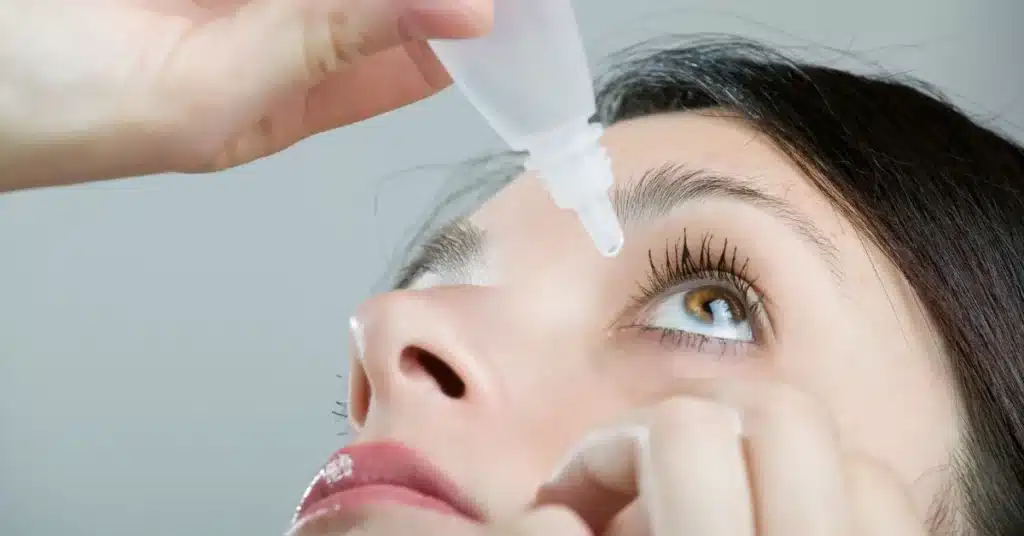Understanding and Managing Dry Eyes Allergies
Dry eyes and allergies are two common eye-related issues that many people experience.
These two problems are often related to each other.
Research published by The National Library of Medicine stated that incidence rates of dry eyes and allergies among people were 47.2% and 17.8%.
Dry eyes are characterized by dryness, redness, itching, and a gritty sensation.
Allergies can exacerbate these symptoms, leading to discomfort and irritation.
In this article, we will explore dry eyes allergies in detail and understand do allergies cause dry eyes.
We will also provide ways to treat dry eyes caused by allergies to promote better comfort.
Do allergies cause dry eyes
Yes, allergies can cause symptoms of dry eyes.
Here is how allergies can lead to dry eyes:
Inflammatory response
Pollen, dust mites, pet dander, and mold spores are some of the allergens.
When your eyes are exposed to these allergens, your immune system may overreact.
It can triggers an inflammatory response.
This response can lead to changes in the eye’s tear film and decrease the production of tears.
As a result, the eyes may feel dry and uncomfortable.
Rubbing
Allergies can cause itching and irritation in the eyes.
When people rub their itchy eyes vigorously, it can disrupt the tear film and exacerbate dryness.
Seasonal allergies
Seasonal allergies, such as hay fever, can trigger allergic reactions that affect the eyes.
During peak allergy seasons, airborne allergens like pollen can irritate and dry out the eyes.
You can wear special glasses outside to make your dry eyes feel better during spring allergies.
Inside your home, you can use machines that clean the air, called air filters.
These steps can help your eyes stay comfortable.
Allergic reaction
Systematic allergic reactions, such as Hives or Angioedema, can also affect the eyes indirectly.
It may cause changes in the body’s overall physiology, including tear production.
Allergic reactions to eye products
Some individuals may be allergic to certain eye drops, contact lens solutions, or other eye care products.
Using these products can trigger allergic reactions that result in dry eyes.
Ways to treat dry eyes allergies
Treating dry eyes caused by allergies involves both managing the underlying allergy and providing relief for the dry eye symptoms.
Here are some steps you can take to treat dry eyes resulting from allergies:
Identify and avoid allergens
Identify the specific allergens triggering your allergic reactions.
Try to avoid your exposure to these allergens by keeping windows closed during high pollen seasons.
Use allergen-proof bedding covers, clean your home regularly, and minimize contact with pets if you are allergic to them.
Medications

Over-the-counter or prescription eye drops are available for both dry eyes and allergies.
These eye drops often contain antihistamines to address allergic reactions and lubricants to soothe dryness.
Purchasing effective and safe eyedrops from WowRx is easy.
Artificial tears
Lubricating eye drops, or artificial tears, can help relieve the dryness and discomfort associated with allergies.
Preservative-free artificial tears are generally preferred, as they are less likely to cause irritation with long-term use.
Avoid eye rubbing
Avoid rubbing your eyes. This can worsen the irritation and potentially damage the cornea.
If your eyes are itchy, try rinsing them or gently patting them with cold water instead.
Allergy shots
If allergies significantly impact your quality of life, your doctor may recommend Immunotherapy (allergy shots).
This will desensitize your immune system to specific allergens over time.
Consult a doctor

If symptoms persist or worsen despite trying these remedies, consult an eye specialist.
They can recommend tailored treatments or therapies to address both your allergies and dry eyes.
Conclusion
Allergies can cause or worsen the symptoms of dry eyes.
Allergens like pollens, pet dander, dust mites, and mold spores can make eyes red, itchy and dry.
Also, certain eye care products can trigger or worsen the discomfort associated with dry eyes.
Managing allergies and their effects on your eyes is essential.
This includes identifying allergens, using appropriate medications, and adopting good eye care practices.
Lubricating with artificial tears and avoiding excessive eye rubbing can make a substantial difference in your eye comfort.
Moreover, it is crucial to consult with your doctor before starting any treatment, especially Immunotherapy.
Prioritizing your health and staying informed about the benefits and risks of treatments will guide you toward better overall well-being.
Frequently Asked Questions
Can allergies cause dry eyes?
Yes, allergies can cause dry eyes. When you are allergic to things like pollen or pet dander, your eyes can get itchy and red. Rubbing them worsens dryness. Allergies can make your eyes dry and uncomfortable. Managing allergies can help relieve dry eye symptoms.
Can dry eyes be a result of eye rubbing?
Yes, rubbing your eyes vigorously, especially due to allergy-related itching, can worsen dry eye symptoms. Rubbing disrupts the tear film and potentially damages the cornea. It is best to avoid excessive eye rubbing.
How to treat dry eyes allergies?
Treating dry eyes allergies includes identifying allergens, using allergy medications, lubricating with artificial tears, and avoiding eye rubbing. For more severe cases of allergies, your doctor may recommend Immunotherapy.
What medications can I take to treat dry eyes allergies?
You can take over-the-counter or prescription eye drops to treat dry eyes allergies. They contain antihistamines and lubricants. Consult a doctor for the most suitable medication based on your specific symptoms and needs.
WowRx uses only high-quality sources while writing our articles. Please read our content information policy to know more about how we keep our content reliable and trustworthy.






